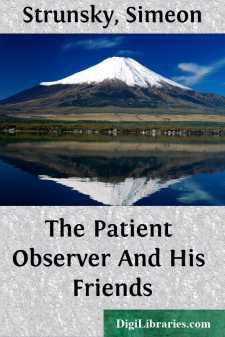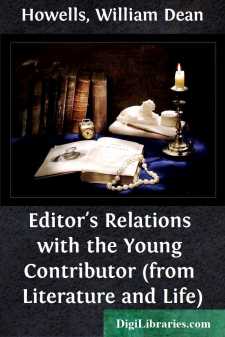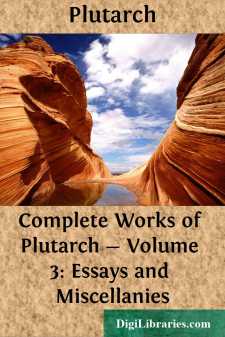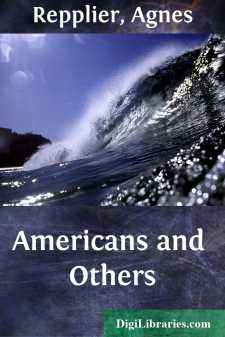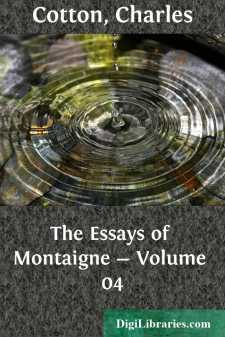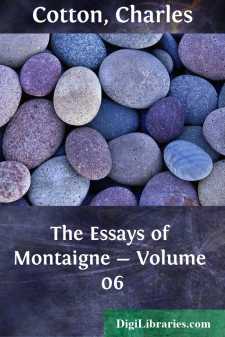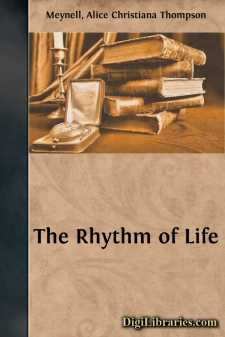Literary Collections
- American 84
- Ancient, Classical & Medieval 14
- Asian 1
- Australian & Oceanian 1
- Canadian 55
- Continental European 121
- English, Irish, Scottish, Welsh 179
- Essays
- General 24
- Letters 46
- Middle Eastern 1
Essays Books
Sort by:
by:
Francis Bacon
Of Truth WHAT is truth? said jesting Pilate, and would not stay for an answer. Certainly there be, that delight in giddiness, and count it a bondage to fix a belief; affecting free-will in thinking, as well as in acting. And though the sects of philosophers of that kind be gone, yet there remain certain discoursing wits, which are of the same veins, though there be not so much blood in them, as was in...
more...
by:
Simeon Strunsky
COWARDS It was Harrington who brought forward the topic that men take up in their most cheerful moments. I mean, of course, the subject of death. Harrington quoted a great scientist as saying that death is the one great fear that, consciously or not, always hovers over us. But the five men who were at table with Harrington that night immediately and sharply disagreed with him. Harding was the first to...
more...
The new contributor who does charm can have little notion how much he charms his first reader, who is the editor. That functionary may bide his pleasure in a short, stiff note of acceptance, or he may mask his joy in a check of slender figure; but the contributor may be sure that he has missed no merit in his work, and that he has felt, perhaps far more than the public will feel, such delight as it can...
more...
by:
Plutarch
Epicurus's great confidant and familiar, Colotes, set forth a book with this title to it, that according to the tenets of the other philosophers it is impossible to live. Now what occurred to me then to say against him, in the defence of those philosophers, hath been already put into writing by me. But since upon breaking up of our lecture several things have happened to be spoken afterwards in...
more...
I. THE SCENE Yes, of course it is an experiment! But it is made in corpore vili. It is not irreparable, and there is no reason, more's the pity, why I should not please myself. I will ask—it is a rhetorical question which needs no answer—what is a hapless bachelor to do, who is professionally occupied and tied down in a certain place for just half the year? What is he to do with the other...
more...
by:
Agnes Repplier
A Question of Politeness"La politesse de l'esprit consiste à penser des choses honnêtes et délicates." A great deal has been said and written during the past few years on the subject of American manners, and the consensus of opinion is, on the whole, unfavourable. We have been told, more in sorrow than in anger, that we are not a polite people; and our critics have cast about them for...
more...
by:
Henry Van Dyke
PRELUDEAN ANGLER'S WISH IN TOWNWhen tulips bloom in Union Square,And timid breaths of vernal airAre wandering down the dusty town,Like children lost in Vanity Fair; When every long, unlovely rowOf westward houses stands aglowAnd leads the eyes toward sunset skies,Beyond the hills where green trees grow; Then weary is the street parade,And weary books, and weary trade:I'm only wishing to go...
more...
by:
Charles Cotton
He seems to me to have had a right and true apprehension of the power of custom, who first invented the story of a country-woman who, having accustomed herself to play with and carry a young calf in her arms, and daily continuing to do so as it grew up, obtained this by custom, that, when grown to be a great ox, she was still able to bear it. For, in truth, custom is a violent and treacherous...
more...
by:
Charles Cotton
Having considered the proceedings of a painter that serves me, I had a mind to imitate his way. He chooses the fairest place and middle of any wall, or panel, wherein to draw a picture, which he finishes with his utmost care and art, and the vacuity about it he fills with grotesques, which are odd fantastic figures without any grace but what they derive from their variety, and the extravagance of their...
more...
THE RHYTHM OF LIFE If life is not always poetical, it is at least metrical. Periodicity rules over the mental experience of man, according to the path of the orbit of his thoughts. Distances are not gauged, ellipses not measured, velocities not ascertained, times not known. Nevertheless, the recurrence is sure. What the mind suffered last week, or last year, it does not suffer now; but it will...
more...



